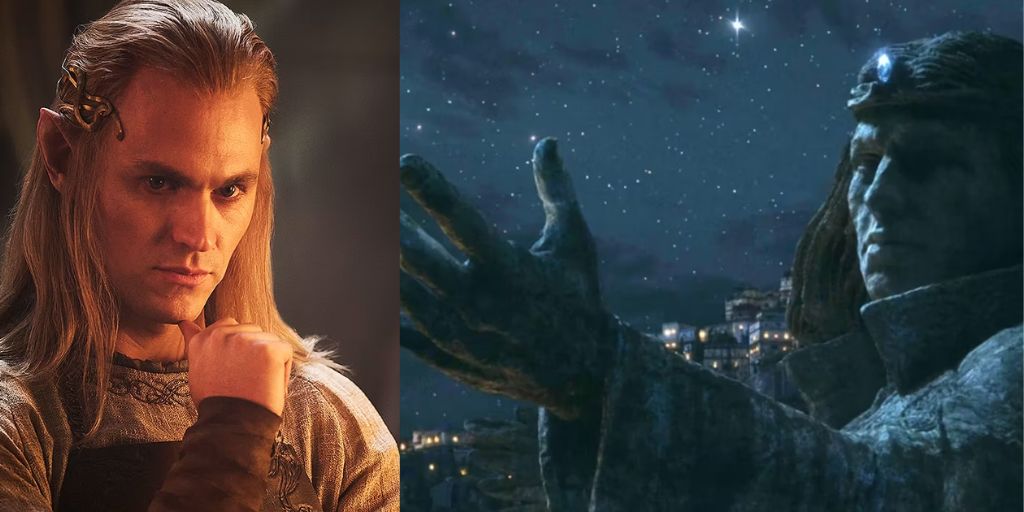In the first season of The Lord of the Rings: The Rings of Power, viewers were introduced to a group of Númenóreans known as “the Faithful.” This group remains in the background while the majority of Númenor is consumed by pride and isolation.
The Faithful are portrayed with Elendil (played by Lloyd Owen) as their main representative. As the series continues into its second season, many fans are eager to understand more about who the Faithful are, what they believe, and their role in the grand narrative.
The Faithful: An Overview
The Faithful, also known as the Elendili, are a faction of Númenóreans who are deeply committed to the traditions of their ancestors. The name Elendili means “Elf-friends” in the Elvish language Quenya.
This group is distinguished by their unwavering loyalty to the Valar, powerful spiritual beings in Tolkien’s world, and their respect for the divine creator, Eru Ilúvatar. Unlike the majority of Númenóreans, who either rebelled against or forgot about the Valar, the Faithful remain devoted and do not dishonor these spiritual entities.
The Faithful’s Beliefs and Practices
The Faithful follow the teachings and customs of their ancestors, particularly their devotion to the Valar. They believe in the “Gift of Men,” which the Elves refer to as death.
While many Númenóreans sought immortality by trying to reach Valinor, the Faithful accept death as a natural and integral part of life. This acceptance reflects their adherence to the old ways and their refusal to pursue immortality as the Elves do.
In addition to their devotion to the Valar, the Faithful also worship Eru Ilúvatar, the supreme deity in Tolkien’s universe.

According to Tolkien’s Unfinished Tales, the Faithful regularly climbed Meneltarma, a sacred mountain in the center of Númenor, to worship Eru. This practice was a significant part of their religious life. However, the situation changed drastically when Ar-Pharazôn (played by Trystan Gravelle) became king.
Pharazôn’s Reign and the Persecution of the Faithful
Ar-Pharazôn, once a devotee of the Valar, began to challenge the traditional practices and beliefs of Númenor. Under his rule, the king outlawed the worship of Eru Ilúvatar and prohibited climbing Meneltarma for religious reasons.
Those who defied this edict faced severe punishment, including the death penalty. This crackdown forced many of the Faithful to practice their religion in secret to avoid persecution.
Despite the changing tides, the Faithful remained dedicated to their beliefs and traditions. Elendil’s name, meaning “Elf-friend,” symbolizes this commitment.
The Faithful’s loyalty to the Valar and their friendship with the Elves, who were viewed with suspicion by the King’s Men, highlights their adherence to the old ways and their resistance to the prevailing sentiment of distrust and animosity towards the Elves.
The Downfall of Númenor and the Faithful’s Struggle
Towards the end of the Second Age, Númenor focused its efforts on defeating Sauron (played by Charlie Vickers in Rings of Power). Initially, the Faithful opposed the dark lord, hoping to protect their land and restore their traditions.
However, Sauron, a cunning and deceitful Maia, managed to trick Ar-Pharazôn into believing that Eru Ilúvatar was merely a creation of the Valar designed to keep Men under control.
Sauron’s manipulation led Pharazôn and his followers to worship Melkor (also known as Morgoth), the original Dark Lord. This shift in allegiance resulted in a period of darkness and human sacrifice, with the Faithful often being the victims of these grim practices.
The Faithful’s commitment to their beliefs made them targets in this time of turmoil, as their resistance to the new religious practices and their continued worship of the Valar set them apart.
The Great Wave and the End of Númenor
Sauron exploited Pharazôn’s fear of death, convincing him to invade Aman, the continent where Valinor is located, in a bid to gain immortality. This invasion attempt, akin to a Tower of Babel event, ended in disaster.
Eru Ilúvatar, angered by the Númenóreans’ actions and their defiance, unleashed a great wave that destroyed Númenor. This cataclysmic event rivaled the biblical Great Flood, wiping out the entire kingdom and punishing its inhabitants for their wickedness.
The Faithful, though greatly diminished in number, managed to survive this catastrophic event. Their survival was not a mere stroke of luck but a testament to their unwavering faith and dedication.

Before the disaster struck, Elendil’s father, Amandil, had sailed to Aman to seek forgiveness and deliverance from Sauron. Amandil also instructed Elendil to prepare for any potential disaster by assembling a fleet of ships. When the waves came, Elendil, his sons, and other Faithful managed to escape to Middle-earth.
The Legacy of the Faithful and Their Impact on Middle-earth
Elendil and his sons, Isildur (played by Maxim Baldry) and Anárion, arrived in Middle-earth and founded the Kingdoms of Arnor and Gondor. Elendil became the first High King of these realms, which would play a crucial role in the ongoing struggle against Sauron.
Despite the loss of his homeland, Elendil’s dedication to Eru Ilúvatar and his resistance to the darkness of the Second Age earned him a significant place in Middle-earth’s history.
Elendil and his sons fought alongside the Elves in the War of the Last Alliance, the final battle of the Second Age. Although Elendil fell in battle, his son Isildur succeeded in defeating Sauron and claiming the One Ring. Isildur’s possession of the Ring was short-lived, but his actions set the stage for the eventual downfall of Sauron.
The Faithful’s Influence in Later Ages
The legacy of the Faithful extended beyond the events of the Second Age. Centuries later, Elendil’s descendant, Aragorn, returned to reclaim the thrones of Arnor and Gondor. Aragorn played a crucial role in the final defeat of Sauron and the destruction of the One Ring. His marriage to an Elf, Arwen, honored the Faithful’s enduring connection with the Elves and their commitment to the old ways.
The Faithful’s story serves as a reminder of the enduring power of faith and dedication in the face of overwhelming adversity. Despite their trials and the eventual fall of Númenor, their commitment to their beliefs and their influence on Middle-earth’s history highlight their significant role in the larger narrative.
The Faithful’s Legacy in The Rings of Power
As The Rings of Power continues to unfold, the Faithful, including key characters like Elendil and Tar-Míriel (played by Cynthia Addai-Robinson), remain central to the story.
Their secretive actions and resistance to the prevailing trends in Númenor emphasize their enduring commitment to their values. Despite facing criticism and challenges, the Faithful’s role in the battle against Mordor and their continued faithfulness highlight their importance in the series.

The depiction of the Faithful in The Rings of Power brings to light their significant impact on the events of the Second Age and their lasting influence on Middle-earth. Their story is a testament to the enduring nature of faith and loyalty, even in the face of great challenges and adversity.
The Faithful’s journey in The Rings of Power reflects their complex history and their vital role in the larger narrative of Middle-earth. Their struggles, beliefs, and legacy continue to resonate with fans and add depth to the rich views of Tolkien’s world.





